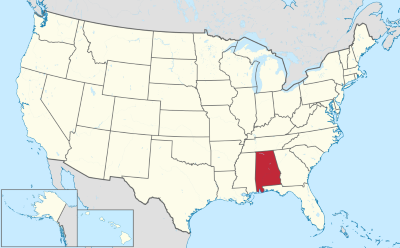Here you’ll find the largest list with Alabama hosting reviews. We’ve listed all Alabama hosting providers with our UNCENSORED review and that of users.

Quick Facts
Internet speed: 28.5 Mbps (average); 40 Mbps (Peak);
Population: 4.85 million;
Broadband coverage: 72%;
Main Types of Connections: Fiber-optic, Cable, DSL
Average cost: ~$40 per month (Numbeo – May 2017)
Major ISPs: AT&T, Troy Cable
Biggest Market Share: AT&T (~23%)
Major Colocation Datacenters: Fresh Technology, Level 3 Communications, TW Telecom
Internet in Alabama
According to latest stats published by fastmetrics.com, Alabama has an average Internet connection speed of 28.5 Mbps and an average peak connection speed of 40 Mbps.
Broadband Internet in Alabama – Statistics, Figures, Federal Funding Programs
In 2015, the population of Alabama was 4.85 million. According to broadbandnow.com, 72% of the population has complete access to broadband Internet, while the remaining 28% either use old technology to access the Internet (e.g. dial-up) or are not connected to the Internet altogether.
Main Types of Broadband Connections
The main types of broadband connections in Alabama are as follows:
– DSL Internet
– Cable Internet
– Fiber-optic Internet
DSL Internet is the most popular form of access to the Internet, with 86.5% of Alabamians being connected to any of the main types of DSL connections (ADSL, VDSL, etc.).
Cable Internet is the second most popular form of access to the Internet. It is used by 69.7% of Alabamians.
However, fiber-optic Internet is the least popular of all. It is used by a mere 5% of Alabamians.
Major Internet Service Providers
The Internet industry in Alabama remains highly fragmented. The most important Internet Service Providers in Alabama are as follows:
– AT&T
– Troy Cable
– Zito Media
ISPs which provide services to companies only are the following:
– Northland Communications
– Bright House Networks
– CableOne
There are a little over 80 regional ISPs in Alabama. Over 80% of the population has access to two or more ISPs, which means that the remainder of 20% lives in a so-called “underserved” area, where there is no provider or only one provider.
Compared to a worriyingly high number of states where an ISP might dominate the entire Internet market (e.g. Wyoming and Maine), there are many ISPs in Alabama, which naturally fosters a healthy and competitive market.
However, 20% is still a high percentage, and it has been subject to a lot of debate and criticism from NGOs and the population itself. Federal-level funding programs such as “The Connecting ALABAMA Initiative” have been created to address this issue and it is expected that in the following years the broadband coverage will also increase considerably in percentage points.
Price-wise, getting access to the Internet in Alabama might prove somewhat pricey relative to other states. For example, Troy Cable offers Internet access starting at $43.95 for their Gold package, which comprises speeds of 15 Mbps downlink and 5 Mbps uplink. AT&T, Zito Media and Knology offer similar pricing and speeds. Due to the fact that ISPs are, in general, available only in certain areas, customers might need to also get in touch with the desired company to confirm serviceability. Customers located in rural areas are the most prone to this reality.
Colocation Datacenters in Alabama
According to datacentermap.com, there are currently 8 colocation datacenters distributed across 3 cities in Alabama. They are as follows:
– Birmingham – 3 colocation datacenters;
– Mobile – 3 colocation datacenters;
– Montgomery – 2 colocation datacenters;
Colocation Datacenters in Birmingham:
– Fresh Technology
– Level 3 Communications
– TW Telecom
Colocation Datacenters in Mobile:
– Server Corps
– TW Telecom
– Level 3 Communications
Colocation Datacenters in Montgomery:
– TW Telecom 1, 2
The colocation datacenter industry in Alabama is not the most thriving in the United States, due to many reasons centered around very high risk of natural disasters (frequent tornadoes, hurricanes, floods, thunderstorms), somewhat inhospitable climate, and lack of proper Internet (i.e. broadband) infrastructure that would attract significant investment in the area. However, this tendency is bound to change soon, because Alabama is also one of the most affordable markets in the U.S. to operate a datacenter (11th), according to a recent study conducted by The Boyd Company. Google is currently building a 100-acre datacenter in Jacksonville, north Alabama, which is estimated to $600 million. This will encourage many companies to establish new facilities in the area, which results in more money being granted for the further growth and expansion of the Internet infrastructure, which needs urgent revamping.

